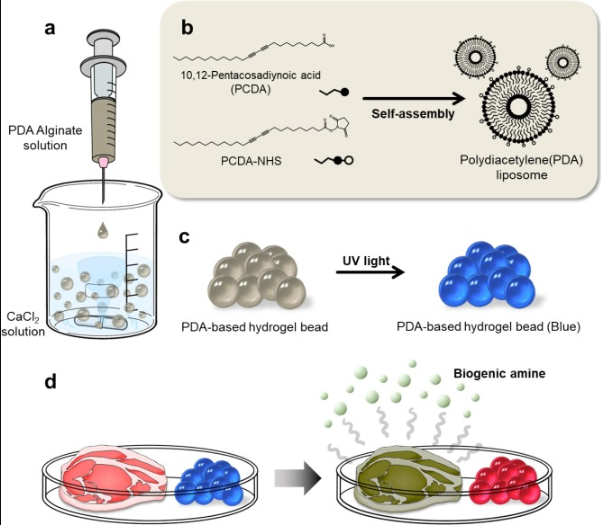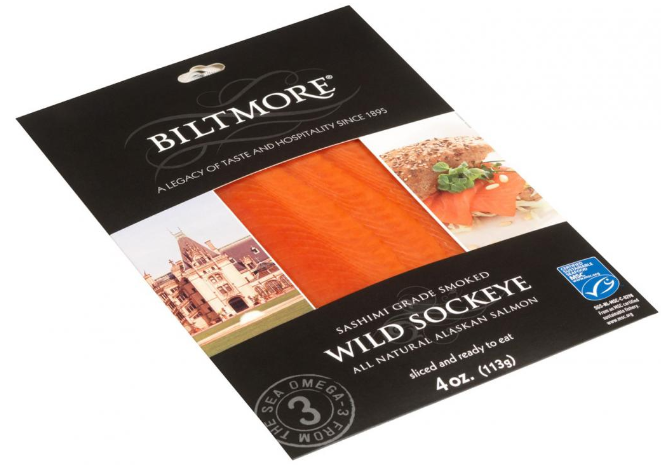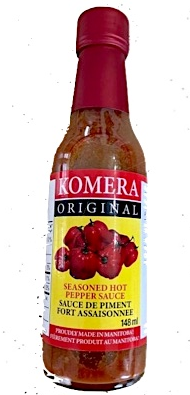Scientists from Korea (Jang et al., 2023 Polydiacetylene-based hydrogel beads as colorimetric sensors for the detection of biogenic amines in spoiled meat. Food Chemistry Vol 403, March 2023. https://www.sciencedirect.com/science/article/pii/S0308814622022798?via%3Dihub) developed a colorimetric sensor using polydiacetylene (PDA)-based hydrogel beads that change color upon binding with biogenic amines (Bas), to detect meat spoilage. The PDA-based hydrogel beads showed an apparent color change from blue to red in the presence of BAs in the liquid or vapor phase and were able to detect BAs from spoiled pork meat after four days. The PDA-based hydrogel beads can visually confirm the presence of BAs in solution or vapor form. Cadaverine and propylamine were rapidly detected with distinct color changes in the solution and vapor phases. The spoilage of pork meat at room temperature could be detected after two days. The PDA-based hydrogel beads could detect spoilage of meat left at room temperature on the second day. The beads are manufactured economically from edible alginate. Because the color change occurs as an irreversible reaction, the sensor can also be used to ascertain the food condition during storage and distribution.
ruth
An outbreak of Listeria monocytogenes was linked to Deli meats (cold cuts, lunch meats, hot dogs, and pâtés) and deli-sliced cheeses. The outbreak caused 16 illnesses, 13 hospitalizations, and one death. Deli meats and cut cheeses are known sources of Listeria illnesses. Listeria can easily spread among food, food preparation surfaces like deli slicers, and hands, and therefore is difficult to detect. Also, Listeria is a hardy bacterium that can be difficult to remove once it is present in a deli or a food processing facility. It can survive and grow at cold temperatures in a refrigerator. CDC data showed that deli meat and cheese bought at deli counters in multiple states were the likely sources of this outbreak. The outbreak strain of Listeria was found in open packages of mortadella, ham, and salami sliced at the deli and a deli in Brooklyn, New York. A single deli or food source was not identified. Probably because Listeria spreads easily between food and the deli environment, and it can live for a long time in deli display cases and on equipment. A contaminated food likely introduced the outbreak strain of Listeria into delis in multiple states.@ https://www.cdc.gov/listeria/outbreaks/deli-11-22/index.html#:~:text=This%20outbreak%20is%20over.,hot%20to%20kill%20any%20germs
Get the most up-to-date outbreak information here.
ruth
The FDA reported that Seven Seas International USA, LLC (St. Petersburg, Florida is) voluntarily recalling 295 cases of Biltmore Smoked Sockeye Salmon with production lot R4058 because Listeria monocytogenes may be present in some products. Routine regulatory testing conducted by the Florida Department of Agriculture and Consumer Services discovered the defect. Only packages sold before 14th March 2023 with a lot code R4058 printed on the clear plastic film that protects the product are affected by this recall. The product was sold only at Publix Supermarkets. @ https://www.fda.gov/safety/recalls-market-withdrawals-safety-alerts/seven-seas-international-usa-llc-voluntarily-recalling-biltmore-smoked-sockeye-salmon-because
Seven Seas International USA, LLC of St. Petersburg, Florida is voluntarily recalling 295 cases of Biltmore Smoked Sockeye Salmon with production lot R4058 because Listeria monocytogenes may be present in some product. The issue was discovered through routine regulatory testing conducted by the Flor
ruth
According to the CFIA, Komera (Warren, Manitoba) has recalled Komera Original branded Seasoned Hot Pepper Sauces from the Canadian marketplace due to suspected Clostridium botulinum contamination and may permit the growth of. Clostridium botulinum. The recalled product has been sold in Alberta, Manitoba, Quebec, Canada, and online and may have been distributed in other provinces and territories. There have been no reported illnesses associated with the consumption of this product. @ https://recalls-rappels.canada.ca/en/alert-recall/komera-original-brand-seasoned-hot-pepper-sauce-recalled-due-potential-presence




